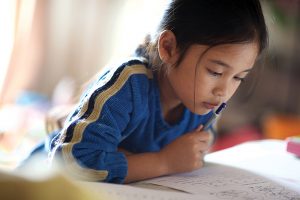Making the Grade
It has been a tough past few years since the pandemic erupted, causing students to engage in alternative pathways in their learning and social journeys. Inevitably, this lapse in crucial development is coming to light in nationwide reports of students falling behind.

Florida schools are distinctive in that they reopened more rapidly than other states following the pandemic, mandating an option of in-classroom education in August 2020. The trend of adjusting to remote learning and virtual classrooms were not as impactful on Florida’s youth as in other states, and did not initiate an expectation of alternative learning models.
As all subjects progressively build on previously learned material, any loss of understanding received with that in-classroom guidance can be detrimental. This is exacerbated by still-rapidly spreading illnesses that cause both students and teachers to miss out on essential class time. Yet, the emotional and physical repercussions of COVID have still led to an increased mental health crisis, absenteeism and behavioral challenges—all of which are correlated to educational performance.
“[Learning] gaps vary depending on the age of students when they lived through the pandemic. I think we see the gaps more in math than in other areas. We see even more issues with student well-being though. We experience more students with anxiety and depression than we did pre-COVID,” says Alex Birchenall, assistant head of school at Windermere Preparatory School.
It is not difficult to determine from where these struggles originate—from a focus on sickness and death during the pandemic, to high emotions in the news as well as in everyday interactions. The uncertainty generated chaos abruptly; crippling anxiety over what’s to come, or for some, apathy and a lack of motivation. The standards set by adults are always monitored by children, and they will act accordingly.
“The environment that we see right now in our society is one where people are very confrontational and you see the adults behaving badly on a regular basis … we can’t be surprised that kids are mimicking what they’re seeing,” explains Andrew Spar, president of Florida Education Association (FEA). “We need to talk about what is appropriate … parents and schools working together to make sure that we’re developing climates in our schools that are supportive, that are free of bullying and that we help students determine right from wrong in their actions.”
Preparing a generation who has uniquely witnessed world suffering first-hand comes with a detriment to the parents and teachers who are guiding them. There has been a widely reported teacher and staff shortage post-pandemic, as well as a social media outpouring of teachers sharing their experiences of students’ frequently shocking behavior.
This is unfortunate, as just one impassioned teacher can inspire students or even spearhead their trajectory toward success. Many of us still fondly remember those connections from teachers that were so beneficial in shaping our lives, but this becomes more difficult (though not impossible) with a lack of engagement from students. Teachers in the modern age are expected to navigate multiple methods of teaching while being cognizant of the mental health challenges that their students are frequently facing.
Some attribute this to what is called “the iPad generation,” identifying that children raised with screens since infancy might be a huge factor. This alone may be a cause for the shorter attention-spans, lack of social skills or need for technology-driven educational models, only exponentiated by the pandemic. This demonstrates a need to understand younger generations’ technological experience and to incorporate it as a tool, not as a substitute.
“Our students today are digital natives. They haven’t experienced a world without modern technology,” says Birchenall. “While students can often learn to navigate technology more quickly and easily than older generations, technology doesn’t guarantee better learning outcomes. It all comes down to teachers having thoughtfully designed learning experiences.”
Experts recommend methods to address the prevalent resistance to learning, as well as ways to stay involved in order to sense changes in your child’s behavior. Dennis Freeman, owner of In-Home Tutors, has noticed a major loss of confidence among students, prioritizing tutoring that is encouraging, compassionate, and that is aimed to restore that lost confidence. While meeting with a tutor is a proven method of supplementing education and leading students to success, and funding has made high-intensity tutoring more accessible, getting a child back to grade level performance expectations is most successful when parents, schools and tutors work together.
“The cliche is read with your child, every day. Make that one of your New Year’s resolutions: 30 minutes of reading every day… especially if you choose books that the child loves and they’ll begin to enjoy reading and learn that love of getting information from books that are fun rather than a school chore,” recommends Freeman.
While it is no secret that Florida has faced public controversies recently in regard to literature in schools, allowing a child to immerse themselves in the world of a book that they identify with is an essential part of discovering a passion to learn. A love for reading is a gateway to becoming knowledgeable on a wide variety of subjects, learning research skills and developing curiosity. It is a great opportunity to bond with a child by learning together or by expressing excitement about a subject or educational experience.
“Talk about every subject—you connect with your kid in that way. Obviously, you show you care, but it allows you to know what’s going on, it allows you to know what they’re learning, of what they might be struggling with, ways that you can help them, if you need to call a teacher because something’s going on—and if we if we’re not connecting in that way, you tend to miss some of that,” Spar says. “There has to be a strong partnership between the teacher and the parent, and that support system at home is so essential.”
Every child is unique, as is each child’s learning style. Students with learning disabilities were particularly affected by a loss of routine and consistency, lessening the ability to retain information. As schools are focused on educational difficulties among their entire student body, those with a predisposition who need a little extra help can be unintentionally overlooked.
“Have a regular homework time and maybe make it some little ritual; like when homework time comes, put on some specific instrumental gentle music that the kids can respond to, or bring out a homework kit with index cards, sharpeners, pencils and colored ink. … I think you’ll find that really has some positive effects of helping the child develop study skills and the ability to self-start and get the homework done,” says Freeman.
Students who lack motivation or confidence may neglect turning in assignments, or showing up at all—and this can originate from a perceived lack of interest in their day-to-day assignments and activities. Cultivating an enthusiasm for learning and nurturing it throughout a child’s entire educational progression can help nullify the disruptions that parents and school officials have documented and found characteristic of the emerging generations.










